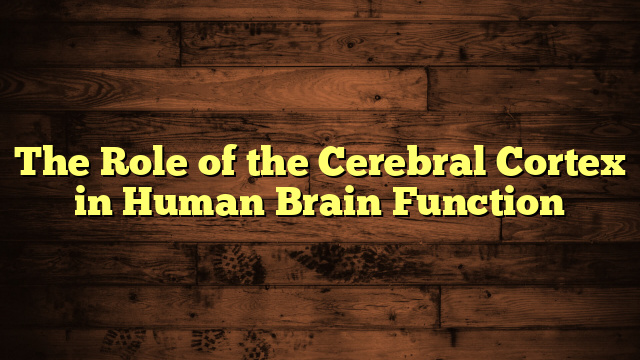The brain cortex is the outer layer of the brain and is responsible for a wide range of functions that are essential for human cognition, behavior, and overall functioning. In this article, we will explore the various functions of the brain cortex in detail.
1. Motor Functions
One of the primary functions of the brain cortex is to control voluntary movements. The motor cortex, located in the frontal lobe of the brain, plays a crucial role in planning, executing, and coordinating movements. Damage to this area of the brain can result in motor deficits and impairments in movement control.
2. Sensory Functions
The sensory cortex, also known as the somatosensory cortex, is responsible for processing sensory information from the environment. This includes touch, temperature, pain, and proprioception (the sense of body position). The sensory cortex is located in the parietal lobe of the brain and is essential for our perception of the world around us.
3. Language Functions
The brain cortex plays a crucial role in language processing. The left hemisphere of the brain, particularly the areas known as Broca's area and Wernicke's area, is responsible for language production and comprehension, respectively. Damage to these areas can result in language difficulties and disorders such as aphasia.
4. Executive Functions
The prefrontal cortex, located in the frontal lobe of the brain, is responsible for executive functions such as decision-making, planning, goal-setting, and impulse control. This area of the brain is crucial for higher-order cognitive processes and is involved in regulating our behavior and emotions.
5. Memory Functions
The brain cortex plays a crucial role in memory formation and retrieval. The hippocampus, located in the temporal lobe of the brain, is responsible for consolidating new memories and storing them for future retrieval. Damage to this area of the brain can result in memory deficits and amnesia.
6. Visual Functions
The visual cortex, located in the occipital lobe of the brain, is responsible for processing visual information from the eyes. This area of the brain is essential for our ability to perceive and make sense of the visual world around us. Damage to the visual cortex can result in visual deficits and impairments in visual processing.
Conclusion
In conclusion, the brain cortex plays a vital role in a wide range of functions that are essential for human cognition, behavior, and overall functioning. From controlling voluntary movements to processing sensory information, regulating emotions, and forming memories, the brain cortex is involved in virtually every aspect of our daily lives. Understanding the functions of the brain cortex can help us better appreciate the complexity and intricacy of the human brain and how it shapes our experiences and interactions with the world around us.
FAQs
1. What is the role of the motor cortex?
The motor cortex is responsible for controlling voluntary movements and coordinating motor functions in the body.
2. How does damage to the sensory cortex affect sensory processing?
Damage to the sensory cortex can result in deficits in processing sensory information, including touch, temperature, pain, and proprioception.
3. What areas of the brain are involved in language processing?
Broca's area and Wernicke's area, located in the left hemisphere of the brain, are crucial for language production and comprehension, respectively.
4. What are executive functions, and how are they regulated by the prefrontal cortex?
Executive functions include decision-making, planning, goal-setting, and impulse control, which are regulated by the prefrontal cortex in the brain.
5. How does the hippocampus contribute to memory formation?
The hippocampus is responsible for consolidating new memories and storing them for future retrieval, playing a crucial role in memory formation.
Unlock Your Mental Potential



